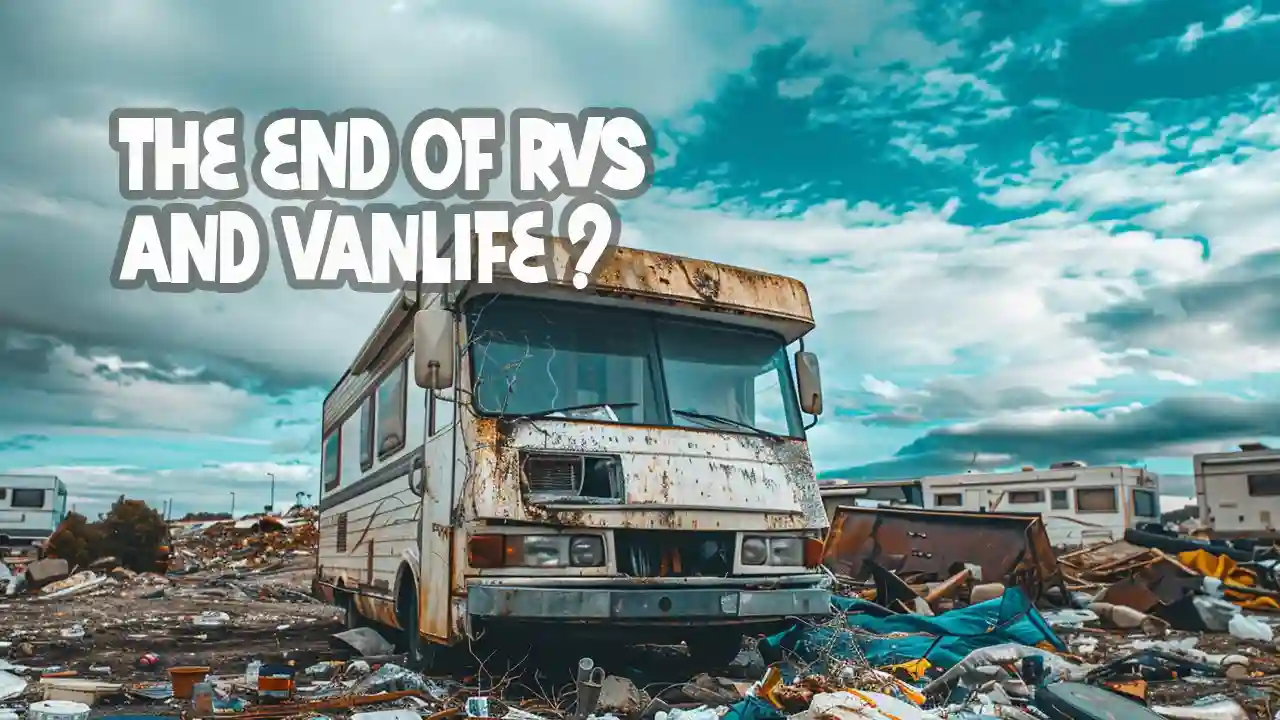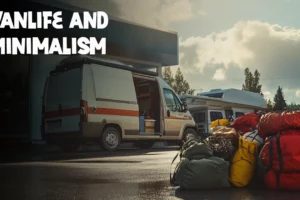
The End of RVs and Vanlife Due to Oil?
Introduction
You know it, friends, Vanlife is, for many, the symbol of freedom, the chance to embark on an adventure whenever we feel like it. But, with growing environmental concerns, diesel RVs are under a lot of scrutiny. With the planned halt of their sale by 2040 and the questions raised by options like electric, hybrid, or hydrogen, we wonder what lies ahead for them.
This article dives into the challenge of staying mobile while being eco-friendly in vanlife, from low-emission zones to the latest innovations. We aim to see if buying or renting such a vehicle still makes sense today. The idea is to explore what solutions exist to make our future road trips more planet-friendly.
RV Living: These Vehicles Are Too Polluting
Introduction to the Dilemma
Vanlife is more than just a trendy hashtag on social media. For many, it’s a quest for freedom, a return to basics, even a form of resistance to rampant consumerism. But here’s the catch: even as we strive to reduce our ecological footprint, our trusty steeds, the diesel RVs, pose a thorny question and are often seen as CO2 generators on wheels by most people.
Let’s be honest, diesel engines aren’t exactly an eco-friendly solution. Fine particulate emissions, nitrogen oxides… the list goes on. Yet, in the vanlife world, they reign supreme. Why? Simply because they offer autonomy and robustness that many of us deem essential for our long journeys. However, and this is a big however, just because we drive diesel doesn’t mean we’ve given up on ecology. Far from it!
Year-Round Vanlife is Quite Eco-Friendly!
Remember, in a previous article, we tackled this tricky subject. After much reflection, we concluded that the vanlife lifestyle, despite appearances, could be considered an eco-responsible approach. Of course, we’re not trying to greenwash, but let’s recap: reduced consumption, significant savings on heating, minimalist lifestyle, thoughtful use of resources… In short, even if our diesel engines aren’t blameless, our lifestyle clearly leans towards the green side. And that’s already something, don’t you think?
But it’s not enough. We need to do better. What is the current state of the situation?
When Will Diesels Be Banned?
Regulatory Status
Let’s get straight to the point: 2035 is the key date. From that year, the sale of new internal combustion engine vehicles, including our beloved diesels, will be prohibited in the European Union. This does not mean your current diesel RV will be scrap overnight; the ban targets sales, not usage. This distinction is crucial!
To clear up any confusion, many believe all diesel vehicles will be banned from the roads. Not true! The law focuses on sales, so if you’re already equipped, you can continue enjoying your trips without fearing police at every turn. However, thinking ahead about future alternatives is wise.
Global Outlook
Several other countries have also set ambitious targets. For instance, the UK plans to end the sale of new petrol and diesel cars by 2030. California, along with other states and countries, aims for a similar timeline, with a ban on new fossil fuel car sales starting in 2035. Japan, while favoring hybrids, has also set targets for the 2030s.
These shifts are part of a broader move towards sustainable mobility, driven by the urgent need to address climate change. The transition is supported by advancements in electric, hybrid, and hydrogen technologies, offering hope for a greener future on the road.
Impact of Low Emission Zones (LEZ)
Low Emission Zones in France Around the Europe
Let’s talk about the famous LEZs, these low emission zones. These are areas where the most polluting vehicles are already politely but firmly denied entry.
- Currently, there are 12 LEZs in metropolitan France. (named ZFE)
- Eurométropole de Strasbourg, Grand Lyon Métropole, Grand Reims Communauté Urbaine, Grenoble-Alpes-Métropole, Métropole du Grand Paris, Métropole de Rouen-Normandie, Métropole Aix-Marseille Provence, Métropole Nice Côte d’Azur, Montpellier-Méditerranée Métropole, Saint-Etienne Métropole, Toulouse Métropole, Clermont-Ferrand
Over the years, these zones will multiply, gradually reducing our playground.
We’re not trying to scare you, but just to say that yes, we’ll need to adapt.
Be very careful when you have to cross one of these zones; we got caught off guard near Grenoble without even realizing it.
Low Emission Zones Around the Europe
In other countries, these zones have different names:
- In Germany, they are called “Umweltzonen” (environmental zones, list here).
- In Italy, there are numerous “Zone a Traffico Limitato” (ZTLs, restricted traffic zones)
- Arezzo, Bologna, Bolzano, Firenze, Genova, Grado, Milano, Napoli, Pisa, Roma, Trieste, Torino o Verona
- In Spain, Madrid and Barcelona have implemented “Zonas de Bajas Emisiones” (ZBE, low emission zones).
- In the United Kingdom, London refers to them as “Low Emission Zones” (LEZ) or “Ultra Low Emission Zones” (ULEZ). Other English cities have implemented “Clean Air Zones” (CAZ).
Low Emission Zones in United States
In the United States, while there are no established low emission zones, Santa Monica, California has a voluntary Zero-Emissions Delivery Zone, which tests green mobility technologies like e-cargo bikes and electric delivery vehicles.
What is the Future of RVs?
Alternatives to Oil
Now that we know we’ll have to move away from oil, what can we do? For our RVs, this means turning to alternative energies: electric, hybrid, and hydrogen. Each option has its appeal. Electric is already well-known for cars, offering silence and zero direct pollution. Hybrid is a bit of the best of both worlds, with a significant reduction in emissions. And hydrogen? Huge potential, with water as the only byproduct. But let’s be honest, each option has its downsides. Costs, range, and infrastructure are all challenges to overcome.
In theory, driving a converted electric vehicle or hydrogen seems like the perfect solution, but in practice, it’s a bit more complicated. Why? Simply because the range, especially for the long trips typical of vanlife, can be limited.
Adapting to a slower pace of travel is entirely possible. That’s great when vanlife is your lifestyle, and you have the time. But for those who only have five weeks a year to enjoy it, it’s a different story. Traveling from Northern France to the warm climates of Morocco, stopping every 300km to recharge, is currently not feasible.
Finding a charging station or a hydrogen station can be like looking for an oasis in the desert.
Future Innovations and Adaptations
But let’s not be those who see the glass as half empty. The future holds innovations and adaptations just around the corner. We’re talking about technological advancements that could revolutionize our approach to vanlife. Greater range, reduced charging times, denser infrastructure… Manufacturers and engineers are on it, and I have a feeling the next few years will bring some pleasant surprises. Yes, we’ll need to adapt and perhaps even rethink our way of traveling, but the future looks promising. And who knows? Maybe soon, we’ll explore roads and trails knowing we’re leaving behind only a light footprint, that of our steps. Imagine solar panels powerful enough to allow you to recover a good portion of energy while driving!
Should You Buy a Recreational Vehicle Today?
Thinking Long-Term
So, is investing in a diesel RV a good idea right now? If we look at the road (and the miles) ahead of us, buying a diesel still makes sense. Why? Because even with the upcoming changes, we still have time before driving bans hit our doors. And let’s be honest, the freedom and memories offered by an RV aren’t going out of style anytime soon. So, yes, for those dreaming of wide open spaces, buying remains an option to consider.
The Rental Option
Now, if long-term commitment gives you cold sweats, why not consider renting? Renting offers flexibility and freedom without the hassles of ownership. You can switch models according to your desires, and who knows, you might fall in love with a greener alternative along the way.
The Rise of Communities and Innovations in Vanlife
Creation of Eco-Responsible Communities
Vanlife isn’t just about the vehicle; it’s also a state of mind. And guess what? Eco-responsible communities are emerging, united by the desire to reduce their ecological footprint. These groups share tips, innovations, and best practices for a greener vanlife. It’s a wonderful way to combine adventure with respect for the environment.
Vehicle Adaptation
As for diesel RVs, they are not being left behind. Innovation is in full swing, with emerging technologies enabling their adaptation. Electric conversion kits, energy efficiency improvements… the possibilities are expanding. A new era is dawning, where vanlife can rhyme with sustainability.



